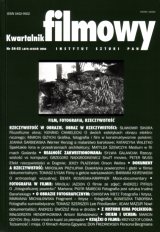Różyczka i karma dla psów
Rosebud and dog food
Author(s): Jerzy PłażewskiSubject(s): Theatre, Dance, Performing Arts
Published by: Instytut Sztuki Polskiej Akademii Nauk
Keywords: Orson Welles
Summary/Abstract: Płażewski writes that his job is to propose an extreme thesis that the “phenomenon of Welles” was undoubtedly a watershed in the history of film art. Paradoxically, the thesis could not have been proposed by critics in the 1940s because they had no evidence and data supporting the claim that Welles really changed the face of the cinema. On the other hand, young critics have regarded Welles as a genius „for ages” and they don’t think it necessary to revise or analyse this view. Płażewski asserts that only the person who has followed the artistic career of the American master of film from the very beginning can make an observation that hits the nail on the head. Therefore, Płażewski tries to find out the decisive factor behind Welles’s greatness, and goes beyond widely-held opinions that Welles’s major contribution was to modernize means of cinematic expression. Płażewski says that the basic value of his work lies in the way he treated the notion of „truth” and in showing that „truth” doesn’t have to be this o r that but can be this a n d that. Płażewski acknowledges that Welles’s cinema made a breakthrough because it glorified “ambiguity”.
Journal: Kwartalnik Filmowy
- Issue Year: 2006
- Issue No: 54-55
- Page Range: 137-144
- Page Count: 8
- Language: Polish

